people
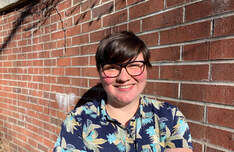
Jenn Coughlan (they/she)- PI
I'm an evolutionary geneticist working primarily to understand the genetic basis of adaptation and speciation. My lab is located in the Department of Ecology and Evolutionary Biology at Yale University. We work on a series of classic speciation and adaptation questions, including, understanding hybrid incompatibilities, life history evolution, ecological isolation and structural variation in Mimulus (a model wildflower system for ecology, evolution and genetics).
I did my postdoctoral training in the Biology Department at UNC Chapel Hill in the Matute Lab, working on the efficacy and genetic basis of mate preference in Drosophila. I finished my PhD in the fall of 2018 from Duke University in the Willis lab, where I worked on the evolution of hybrid seed inviability and the role of chromosomal inversions in adaptation. Before Duke, I completed an MSc at the University of Toronto in the EEB department, and an BSc from Trent University (Peterborough, ON).
Email: jennifer.coughlan [at] yale.edu
Twitter: @Jenn_Coughlan
Google Scholar
I'm an evolutionary geneticist working primarily to understand the genetic basis of adaptation and speciation. My lab is located in the Department of Ecology and Evolutionary Biology at Yale University. We work on a series of classic speciation and adaptation questions, including, understanding hybrid incompatibilities, life history evolution, ecological isolation and structural variation in Mimulus (a model wildflower system for ecology, evolution and genetics).
I did my postdoctoral training in the Biology Department at UNC Chapel Hill in the Matute Lab, working on the efficacy and genetic basis of mate preference in Drosophila. I finished my PhD in the fall of 2018 from Duke University in the Willis lab, where I worked on the evolution of hybrid seed inviability and the role of chromosomal inversions in adaptation. Before Duke, I completed an MSc at the University of Toronto in the EEB department, and an BSc from Trent University (Peterborough, ON).
Email: jennifer.coughlan [at] yale.edu
Twitter: @Jenn_Coughlan
Google Scholar
POSTDOCS
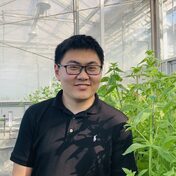
Hongfei Chen, PhD (he/him)
Hongfei completed his PhD under the supervision of Dr. Yaowu Yuan at the University of Connecticut in 2022. His dissertation work leveraged floral divergence in two closely related Mimulus that vary in mating system (M. parishii and M. cardinalis) to understand the genetic basis of floral syndrome evolution. In the Coughlan lab, Hongfei is working to understand the evolution of complex suites of life history traits, including multiple incidences of a novel trait- rhizomes- in high elevation perennials of the M. guttatus species complex.
Google Scholar
email: hongfei.chen [at] yale.edu
Hongfei completed his PhD under the supervision of Dr. Yaowu Yuan at the University of Connecticut in 2022. His dissertation work leveraged floral divergence in two closely related Mimulus that vary in mating system (M. parishii and M. cardinalis) to understand the genetic basis of floral syndrome evolution. In the Coughlan lab, Hongfei is working to understand the evolution of complex suites of life history traits, including multiple incidences of a novel trait- rhizomes- in high elevation perennials of the M. guttatus species complex.
Google Scholar
email: hongfei.chen [at] yale.edu
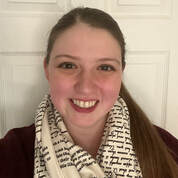
Megan Frayer, PhD (she/her)
NSF PRFB Fellow
Megan completed her PhD under the supervision of Dr. Bret Payseur at the University of Wisconsin, Madison. Her dissertation work explored hybrid zone demographics using a long-term hybrid zone system in European House Mouse. Megan is interested in integrating population genomics with greenhouse work to explore hybrid zone dynamics in Mimulus and leverage admixture mapping to uncover incompatibility loci.
Google Scholar
email: megan.frayer [at] yale.edu
NSF PRFB Fellow
Megan completed her PhD under the supervision of Dr. Bret Payseur at the University of Wisconsin, Madison. Her dissertation work explored hybrid zone demographics using a long-term hybrid zone system in European House Mouse. Megan is interested in integrating population genomics with greenhouse work to explore hybrid zone dynamics in Mimulus and leverage admixture mapping to uncover incompatibility loci.
Google Scholar
email: megan.frayer [at] yale.edu
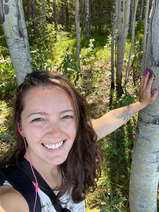
Haley Branch, PhD (she/her)
NSF PRFB Fellow
Haley completed her PhD with Amy Angert at the University of British Columbia, Canada. Her dissertation focussed on the role of plasticity and drought physiology in shaping patterns of rapid adaptation under climate change in Mimulus cardinalis. Haley is also an active advocate for Disability in STEM and has a vibrant research program centering accessibility in Ecology and Evolutionary Biology. Haley is interested in understanding range-wide variation in drought plasticity and its implications for range shifts in Mimulus for her postdoc.
Google Scholar
email: haley[period]branch[at]biodiversity.ubc.ca
NSF PRFB Fellow
Haley completed her PhD with Amy Angert at the University of British Columbia, Canada. Her dissertation focussed on the role of plasticity and drought physiology in shaping patterns of rapid adaptation under climate change in Mimulus cardinalis. Haley is also an active advocate for Disability in STEM and has a vibrant research program centering accessibility in Ecology and Evolutionary Biology. Haley is interested in understanding range-wide variation in drought plasticity and its implications for range shifts in Mimulus for her postdoc.
Google Scholar
email: haley[period]branch[at]biodiversity.ubc.ca
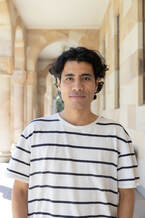
Henry Arenas-Castro, PhD (he/el)
Hutchinson Postdoctoral Fellow
Henry recently completed his PhD with Daniel Ortiz-Barrientos at the University of Queensland, Australia. Henry's dissertation explored the role of postmating prezygotic isolation between replicated ecotypes of Senecio. Henry's postdoctoral work aims to explore coexistence and introgression in a trio of closely related but ecologically divergent Mimulus species. Henry is also passionate about increasing scientific integration across the globe and has published extensively on DEI efforts to increase language accessibility. He is also an active member of SSE's student council and took a lead role in organizing the annual Latine mixer at Evolution.
Google Scholar
email: henry[period]arenasc[at]gmail.com
Hutchinson Postdoctoral Fellow
Henry recently completed his PhD with Daniel Ortiz-Barrientos at the University of Queensland, Australia. Henry's dissertation explored the role of postmating prezygotic isolation between replicated ecotypes of Senecio. Henry's postdoctoral work aims to explore coexistence and introgression in a trio of closely related but ecologically divergent Mimulus species. Henry is also passionate about increasing scientific integration across the globe and has published extensively on DEI efforts to increase language accessibility. He is also an active member of SSE's student council and took a lead role in organizing the annual Latine mixer at Evolution.
Google Scholar
email: henry[period]arenasc[at]gmail.com
GRADUATE STUDENTS
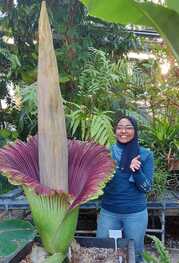
Hagar Soliman, MSc (she/her)
Hagar received her BSc in molecular biology from Cairo University, Egypt, before she decided to switch gears to evolution and pursue an MSc in EEB at Binghamton University in the Sobel lab in 2020 under a prestigious Fulbright scholarship. Since then, she's been interested in understanding the underlying genetic and molecular mechanisms causing hybrid seed inviability in the genus Mimulus.
email: hagar.soliman [at] yale.edu
Hagar received her BSc in molecular biology from Cairo University, Egypt, before she decided to switch gears to evolution and pursue an MSc in EEB at Binghamton University in the Sobel lab in 2020 under a prestigious Fulbright scholarship. Since then, she's been interested in understanding the underlying genetic and molecular mechanisms causing hybrid seed inviability in the genus Mimulus.
email: hagar.soliman [at] yale.edu
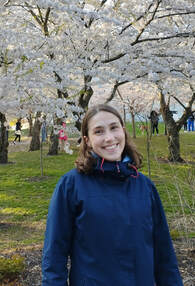
Pia Schwarz, MSc (she/her)
Pia received her bachelor and master's degrees from the University of Buffalo. Pia worked with Trevor Krabbenhoft using genomic approaches to dissect a hybrid zone between two stream fish species. Pia is broadly interested in speciation genetics, and hopes to link a mechanistic understanding of incompatibilities with patterns of introgression in naturally hybridizing Mimulus. Pia is also an avid and awarded tennis player, including receiving the highly prestigious SUNY Chancellor's award for Student Excellence.
email: piafranziska[period]schwarz[at]yale.edu
Pia received her bachelor and master's degrees from the University of Buffalo. Pia worked with Trevor Krabbenhoft using genomic approaches to dissect a hybrid zone between two stream fish species. Pia is broadly interested in speciation genetics, and hopes to link a mechanistic understanding of incompatibilities with patterns of introgression in naturally hybridizing Mimulus. Pia is also an avid and awarded tennis player, including receiving the highly prestigious SUNY Chancellor's award for Student Excellence.
email: piafranziska[period]schwarz[at]yale.edu
UNDERGRADUATE RESEARCHERS
Cage Cochran (Yale, '24)
Lily Hyde (Yale, '27)
Karinne Tennenbaum (Yale, '26)
Hanwen Zhang (Yale, '24)
Quinn Evans (Yale, '25)
Patricia Joseph (Yale, '26)
Abigail Taylor (Yale, '25)
Lily Hyde (Yale, '27)
Karinne Tennenbaum (Yale, '26)
Hanwen Zhang (Yale, '24)
Quinn Evans (Yale, '25)
Patricia Joseph (Yale, '26)
Abigail Taylor (Yale, '25)
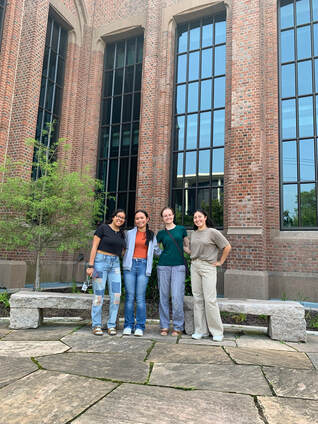
Our exceptional UG team in summer, 2023!
(Left to right: Gabriela Lebron, Patricia Joseph, Abigail Taylor, Ashley Vanegas)
(Left to right: Gabriela Lebron, Patricia Joseph, Abigail Taylor, Ashley Vanegas)
INQUIRIES
We welcome inquiries from prospective postdocs, graduate students, and undergraduate researchers. Please email Jenn with a CV, and a few sentences on what about the lab interests you. For graduate students and postdocs, please also include a few sentences about your previous experiences and what you hope to accomplish working with the lab.
Additionally, postdocs should check this space for forthcoming ads for funded positions, as well as the Yale Institute for Biospheric Studies page for internal funding opportunities. Prospective graduate students should check out the department's excellent graduate student page for more information about the application process and program.
We welcome inquiries from prospective postdocs, graduate students, and undergraduate researchers. Please email Jenn with a CV, and a few sentences on what about the lab interests you. For graduate students and postdocs, please also include a few sentences about your previous experiences and what you hope to accomplish working with the lab.
Additionally, postdocs should check this space for forthcoming ads for funded positions, as well as the Yale Institute for Biospheric Studies page for internal funding opportunities. Prospective graduate students should check out the department's excellent graduate student page for more information about the application process and program.
Previous
Gabriela Lebron (Skidmore College, '25)- SURES summer student
Ashley Vanegas (UVA, '25)- Veterans program summer student
Gabriela Lebron (Skidmore College, '25)- SURES summer student
Ashley Vanegas (UVA, '25)- Veterans program summer student
